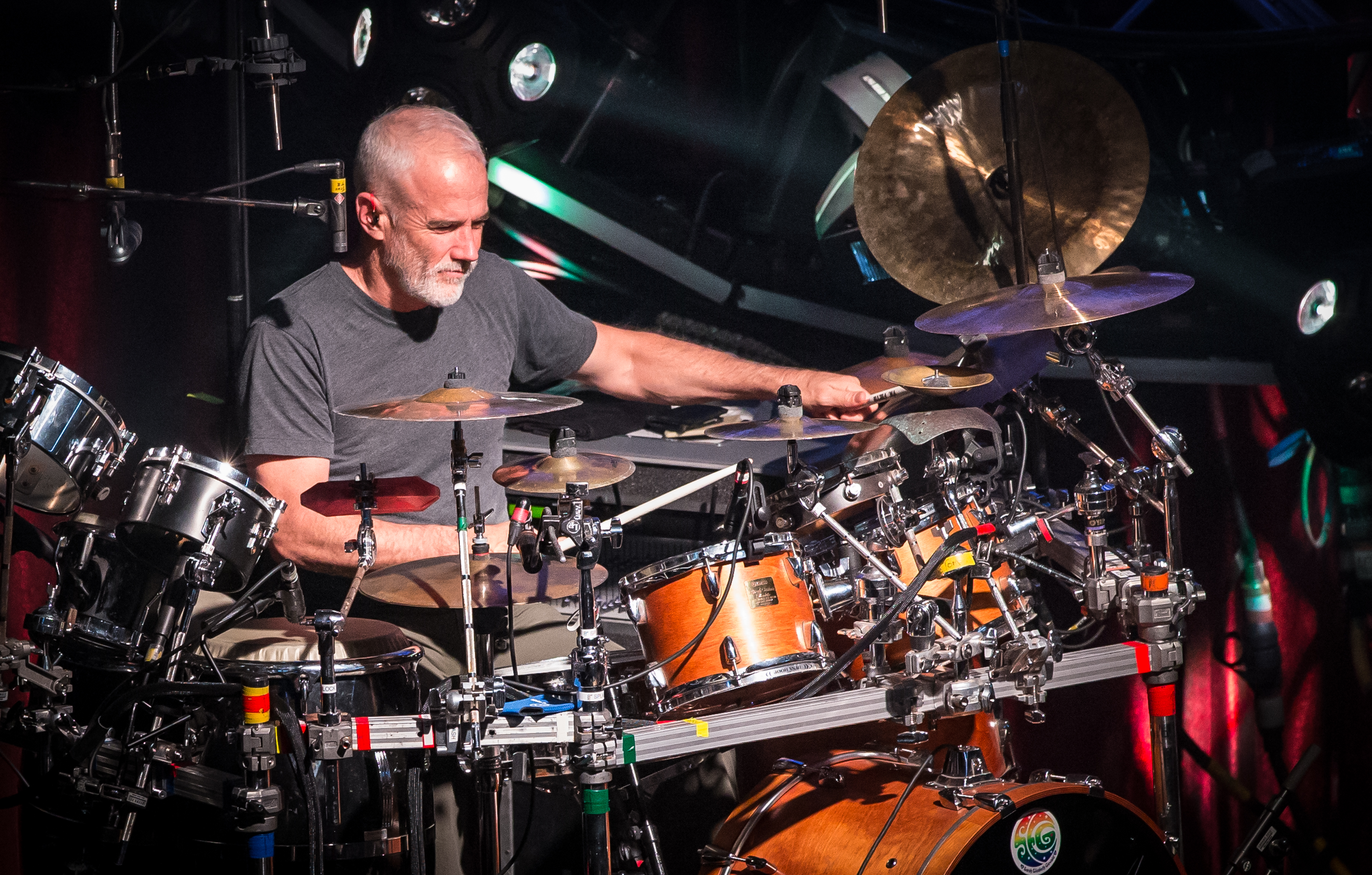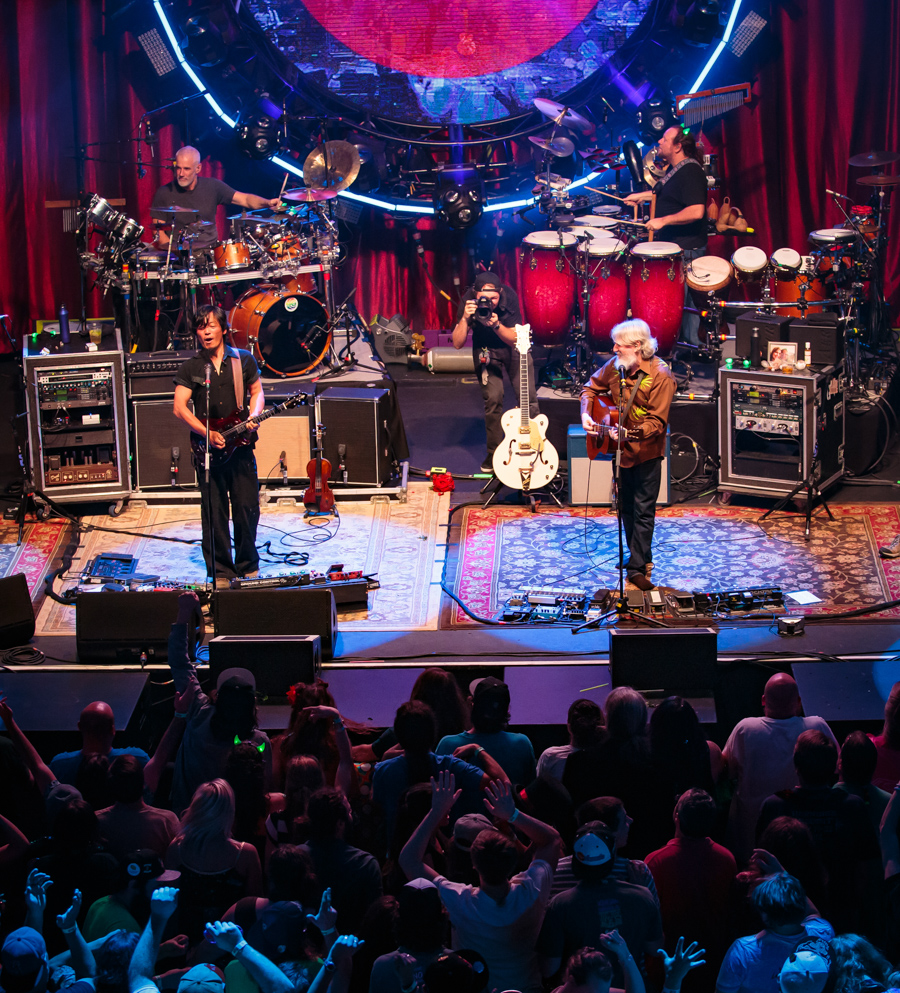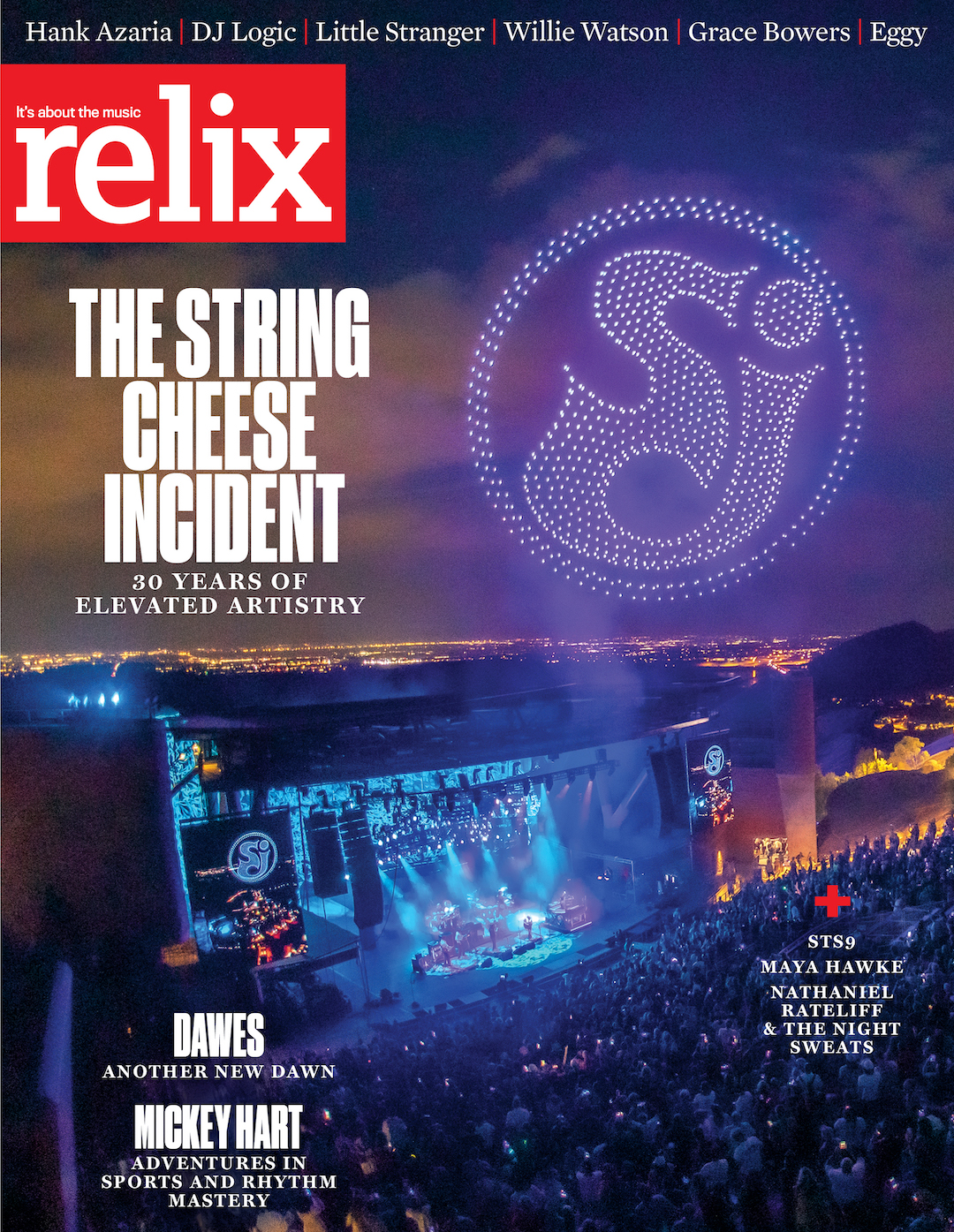String Cheese Incident’s Michael Travis on Electric Forest, Gregg Allman Incident and More
 The String Cheese Incident are no stranger to busy times. Right now, the band is coming off of three headlining gigs at Electric Forest and quickly charging into a tour that will find them running up and down the east coast before returning to a familiar haunt–Red Rocks Amphitheatre–for three nights before heading out west for a brief run of shows.
The String Cheese Incident are no stranger to busy times. Right now, the band is coming off of three headlining gigs at Electric Forest and quickly charging into a tour that will find them running up and down the east coast before returning to a familiar haunt–Red Rocks Amphitheatre–for three nights before heading out west for a brief run of shows.
There’s also a slot at Peach Fest with Gregg Allman, dubbed The Gregg Allman Incident, then there’s Hulaween. And that’s just what’s been announced so far.
Checking in with drummer Michael Travis on the eve of Electric Forest finds him assessing all that lays ahead and reflecting on the years of Electric Forest that have produced some wild sit-ins over the years, bridged genres and given the band a renewed freedom on stage. Travis also touches on the group’s new Sound Lab concept, their date with Allman and the Red Rocks legacy.
Looking back on Electric Forest, does it feel like this is the realization of all of those Horning’s Hideouts and intimate runs you guys have done over the years? Is this the best version of that idea?
Well it’s best in that we were able to capture that initial spirit we had harnessed and percolated down from our influences on events such as Burning Man or the Country Fair and put it in a format that worked for our sub-culture and then made it fully realized at Hornings and then it’s very exciting to bring it here to a whole new audience potentially less indoctrinated because their a Midwest audience and have it be fully complete like that it’s pretty exciting, it’s pretty wonderful to watch and the commitment to real art and real immersive environment instead of just a stage and a field concept and have it really working on all levels and watching the amazing talent base that’s come out of the woodwork to help make it complete.
Over the years, you guys have somewhat bridged the gap between EDM and jambands. Is that a concerted effort or just the natural progression of the festival?
Well a lot of it happened because of Madison House pairing with Insomniac a few years ago and that pushed it toward the EDM thing because that’s what they do, all the electric festivals: EDC, Electric Daisy Carnival and all the other electric festivals, that’s their whole modality is the EDM.
Me and Jason obviously and Kang to a lesser degree were very enthused, and Kyle, were very enthused by how I feel like there’s two arms to psychedelia in the broader world, what I would call The Grateful Dead seaweed brand of psychedelia and European dance music model as more geometric kind of mandala-based psychedelia. We were always intrigued by pushing those together more and more so we had a lot to do with getting Bassnectar involved in a broader hippie audience so yeah it was definitely partly by design and then an extra push in that direction from Insomniac but we definitely hoped to watch the two worlds merge more and more.
As far as Cheese’s music and model is concerned, how do you feel you’ve merged those two worlds of psychedelia?
They’re kind of hard to merge in the same spot in the same exact moment but putting them side by side is kind of what we’ve done and embracing the geometric version and all the things that computer music has to offer as far as the perfection of execution. I think that’s why electronic fans love electronic music partly is because a good DJ is never going to let them down in a dark alley, it’s always going to be perfect and it’s going to be mind-bendingly awesome because it’s been designed elsewhere and then brought to the stage.
The appeal of the seaweed psychedelia is totally different, I think, in that everyone jumps off a cliff and you hope that your guys are going to pull it out and you kind of love when you get to near tragedy and then misses and they pull it back together again and come out on top like The Grateful Dead. Everyone will be there waiting like ‘oh my God they’re kind of unraveling, Oh my God they did it again, they pulled it back together again!’ So they’re pretty differing forms of why they’re appreciated but I think we’ve done a really good job of honoring the house and dubstep type modality while also parallel keeping the seaweed and kind of the great unknown version together.
They do come from pretty different sources though you know the way electronic psychedelia came together is perfection of a manicured producer in a basement just spending every second it takes to make this stuff so it just takes your head off. They’re kind of hard to merge somehow but we kind of nestled them together.
And then there’s someone like Skrillex, who sort of comes from both mindsets you were just talking about.
He started in an Emo band and did all that. I’m not sure if he has ever embraced the Grateful Dead arm of himself so much but you know he is a rocker turned electronic but he I think is the new breed because when he put out that first album, Nice Sprites and Scary Monsters, it just blew every ones heads off, no one had ever heard anything like that. He reinvented everything. Now all sample packs have to come with Skrillex-type presets in order to be valid, he just laid waste to everything that was before him and reinvented all that.
What was it like collaborating with him and getting to know him on a musical level?
It was incredible. He’s just an incredibly smart, talented, motivated, explosive, kind dude. I have nothing but great things to say about him. He came in and picked a Doors song and we’re like ‘yeah let’s do it’ and we worked it all up and the singing was incredible and everything else.
Afterwords I was being kind of rudimentary to the whole electronic world compared to him. I was like, “You know Jim Morrison back in the 60s had a prediction, he said that ‘I see a time in the future when one man and a bunch of machines will be making the music’ and I’m like ‘Skrillex, did you know about that quote?’ and he’s like ‘yeah that’s why it’s cool’ and I’m like ‘oh sorry, you’re right.’” It was very calculated on his part and known that the perfect artist to merge with because of Jim Morrison’s prediction so many years ago.
Transitioning to your recently announced Sound Lab series. Tell me about the type of freedom that allows you as it relates to releasing your music.
We’ve always been about doing it our way and any modality that will allow us to keep doing that and at this point we’ve stepped up our whole world, so much more than in recent years as far as excitement and commitment and we’re doing these yearly retreats where we hideout and write songs for a week and we’re just getting so much new material in an incredibly synergistic way that I haven’t remembered seeing in our band’s history where someone will bring in an idea that’s maybe a hook and a verse or something and then somebody else will say ‘how about this for a chorus?’ and then we’ll say ‘no that’s not great how about this, oh yeah that’s perfect, great.’ Everyone is allowing each other to write each other’s songs so it’s becoming a truly group scenario which is incredible and it keeps everyone invested in the game and it’s an exciting new era and everyone is making time for it.
It’s just a whole new engine for releasing stuff and you know the way the music business is now, it’s what’s happening now for better or worse musician play a show for a living and release the music to keep that going and this just seemed like a nice creative way of continuing to keep it tight and then share our excitement over the band with everyone else in a rapid fire kind of way, we’ve got like three more rounds of songs in the wings waiting for release on this Sound Lab concept.
What would you credit that collaborative spirit and energy to? When did you all realize that everyone was on the same page as far as being really invested and energized about writing songs together?
It starts back at the kind of collapse—the antithesis of that for us was like in 2004 and 2005. There was a lacking and everyone wanted to go in different directions and no one was compelled with the band. Then we started to really delve into the side project thing extensively and everyone learned a lot. We learned a lot about what their worth in the open market is by themselves, learned about instead of being a drummer one of my things was always I want to be this songwriter, I want to be the one creating all these hooks and melodies and everything so EOTO really allowed me to play out all those fantasies on all the different instruments and so when we returned we felt more expressed.
I suppose elsewhere so that we were more ready to buckle down and do exactly what it took to be that role in the band and everyone’s groove concept came together a lot, everyone was more mature and adult and ready to create something that was cohesive so it was more exciting because everyone had relined more of that irritable ego syndrome that always rubs a musical scenario in the wrong direction, an ego is music poison most of the time if not all the time. So everyone had maybe a little more gotten over themselves and were willing to just be a cog in a wheel for the band and I think that was a big part of it.
 Is this Sound Lab idea being viewed as a long-term project and concept?
Is this Sound Lab idea being viewed as a long-term project and concept?
It’s going to be a while because of all the songs we have waiting in the wings. We’ve got five, six songs we just recorded that we just pulled together in Carbondale on our last trip and then we’ve got six more songs unreleased that are already done. So we’ve got at least 11 more songs that are unplayed that are ready to get put out. They’re not all quite ready but I think it’s going to be a couple years probably before we consider another concept.
In that time, will there be a new album?
I think we’re just going to go with this for a while because it just feels like in keeping with what is now. I think modern culture is set up so much so much since we started the band, you know, when we started the band we were pulling out giant paper maps to drive our way around and if you needed to contact the club you had to pull over and put a quarter in a pay phone and everything else and until now everything is so cyber and there’s so much information in people’s lives they move on. ADD, for good and for bad, is at an all-time high.
I don’t even know if anyone would even listen to a full album anymore. I think we’re going to stick with the quick blasts at least until there’s some reason to write an album creatively where we want people to listen in a continuous 8, 10, 12 song format then we might consider it but right now we’re just enjoying staying with the times so to speak.
Transitioning to your collaborative set at Peach Fest with Gregg Allman. Cheese shared a few bills with the Allman Brothers over the years. What are your memories of those gigs?
Oh God, that was a bad year for my memory (laughs). I mean, it’s always fun. The legendary songwriting and the vibe, they’re an anchor. I definitely have incredibly fond memories of playing with Warren Haynes. He’s amongst if not the most adaptable, versatile sit in we’ve ever had. No matter what we threw at him he’d be like ‘oh yeah I got that, I’ll do this, this is cool.’ He’s a super favorite for sure. I don’t think we’ve had a terribly large amount of band interaction besides that with those guys on those shows.
Are you an Allman Brothers fan?
I kind of am, it’s not my thing as much. I like “Blue Sky.” That’s a great song. But I was more into the British scene, Pink Floyd and The Beatles, that kind of thing. The Grateful Dead were kind of big, Phish was huge for me but the Allman Brothers kind of slipped through the wayside.
Southern jam rock feels like more of an acquired taste than the Dead or Phish to some.
It’s just very specific band and I think it has to do with what you’re surrounded by in childhood that feeds your whole social lexicon that you’re looking for an expression of and I think probably the Southern quadrant in the United States the Allman Brothers are a lot more likely to grab that part of you, you know, pluck your heartstrings just like Widespread does. I grew up in Los Angeles, totally different world.
Have you thought about what you might play for that show?
We have talked about it a little bit, we haven’t dug into it too much. We’ve dug in about how to dig in, like how we’re going to get a hold of him and talk about which songs he wants to do and so on. We’ve kind of got our heads pretty immersed in the next few runs of shows coming up.
You guys have had a special relationship with Red Rocks over the years. As the venue celebrates its 75th anniversary and you near those shows, what sort of memories do you have from that venue?
It’s the greatest venue in the country as far as I can tell, it’s my favorite to play. The grandeur is beyond words and the whole incredibly immersive and intimidating fact that the entire audiences is above you, like in a normal festival stage you’ve got the fifteen feet on everyone, you’re looking down on the audience which is somehow comforting a lit bit and separating. But when the first row is exactly the same height as you and everyone else is above you it’s ridiculously potent. I’m maybe preferential to Colorado because I lived there for 27 years or something but the energy in the land and in the rocks right there just makes everything a very heightened sense of reality.















